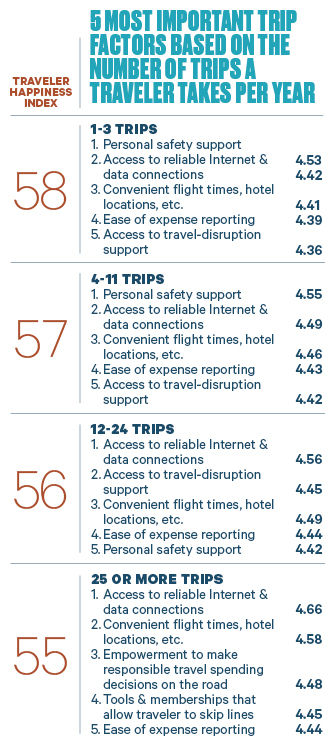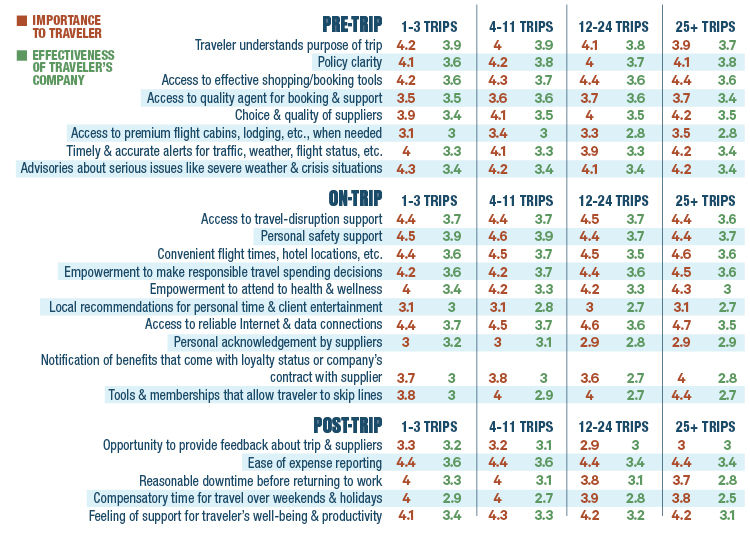
Road warriors are a different breed. They tend to like the
travel. Some feel energized by it. Others say it makes them feel important.
Successful road warriors said the people they travel to see enrich their lives
and work experiences.
The most senior road warrior among the 30 BTN interviewed
for this issue has logged 25 or more trips every year for nearly four decades,
including the 20 years in his current position as a media executive. "People
who have been with [the company] a long time have become friends. Our clients
have become my friends. Traveling for work [is] an opportunity to see the
people I really care about," he said. A journalist said, "If I'm out
of the office, I'm learning something; [I'm] in contact with people I normally
wouldn't meet. … It gets me outside the echo chamber and really allows us to
respond to what motivates people, what drives them." And a nurse
practitioner who is "lucky to be home one week a month" thrives on
the opportunity to "do something different with different people every
week."
The work behind going on a trip, though, is a different
story. A few of the pain points frequent travelers highlighted: shopping,
booking, pre-approvals, standing in lines, trip disruptions and safety and
security compliance. That said, road warriors have different priorities from
other travelers when it comes to travel logistics and processes. Their No. 1
priority is staying connected on the road, a priority they say their companies
have trouble addressing effectively, according to BTN's Traveler Happiness
survey. Connectivity is followed closely by on-trip convenience like flight
times and hotel locations and the power to make quick and confident travel
spend decisions while on the road. "When I'm traveling for business, I'm
definitely going to stay in a corporate hotel chain where I know there'll be a
certain level of service and working Internet. I just want the least risky
option," said a Washington, D.C.-based environmental attorney who logs 25
trips a year.
Highest-Impact Opportunities
Identifying the trip elements most important to travelers,
as BTN has done in the table above, is just half the battle. It's when you
weigh the importance versus how travelers think their companies are doing that
you uncover the biggest opportunities to make a difference. Take a look at the
Traveler Perceptions table below under the on-trip factors for those who travel
25 or more times a year. Travelers rated three factors at 4.4 on a five-point
scale of importance. However, travelers think their companies already do a
decent job at delivering access to travel-disruption support, rating delivery
at 3.6, and personal safety support, at 3.7. Companies scored only 2.7, though,
for tools and memberships that allow the traveler to skip lines. So among three
factors of equal importance, one emerges as the biggest opportunity.
The most important factors with the biggest gaps
between importance and delivery are your biggest opportunities. Dig around in
the Traveler Perceptions table at the end of each Travel
Program Opportunities story for more.
BTN also spoke with a New York-based investment bank
director who traveled upward of 30 times annually, though she has cut back to
about 15 trips as she gained seniority. "I just won't go to a city unless
there is a Ritz-Carlton or a Four Seasons or a Langham. I also like a W on the
lower end, but that's about as low as I can go," she said. "My work
can be very intensive, and I need to know that I'm coming back to a place where
I don't have to worry about other things."
A New York-based private investment firm director who
commutes weekly across the country said his company goes to great lengths to
keep him connected, comfortable and agile. That means five-star hotels and
business and first class airline cabins. He enjoys the highest status on all
domestic airlines so he can access lounges, whisk through security and have a
rental car waiting for him at the terminal. "It's revenue above all else,
in terms of our travel policy," he said. "Even more than when I was
working at one of the big consulting firms, there's a lot of volatility in my
travel pattern now; there was a stretch when I visited 10 cities in seven days
or something like that, so we need the access, and my company values the
flexibility at almost any cost."
Brokering Travel Experience
Not every company can afford the flexibility and services
that come with full-fare first class travel on most trips, but few road
warriors hesitated to pay for a flight change in order to get home earlier.
They also find ways to approximate first class experiences, namely direct
relationships with suppliers. "Loyalty has its rewards," assured the
media executive. "I've continued to get the best rates possible, sometimes
better than our agency can get, and I get benefits from the suppliers. They
will make a seat available to me that may not have been on their website or a
hotel will make a room available when they say they are sold out, or I get an
upgraded car."
Loyalty programs also can benefit road warriors' personal
travel. "If I'm paying for personal travel, I'm doing it wrong" was
one frequent traveler's version of that theme. Some travel managers help road
warriors game the points systems but stay within policy with preferred
suppliers. It's an innovative engagement tactic, particularly for this type of
traveler. Salesforce and other companies leverage social media feeds to allow
preferred suppliers to market specific deals directly to travelers to pique
their interest, and Microsoft does
so through its Tripism platform.
Road warriors also use suppliers' apps to skip certain
processes like printing boarding passes or checking in at hotels. BTN's survey
showed that this is a particular pain point—and one that companies haven't
solved to road warriors' satisfaction. More hotels have implemented
smartphone-enabled keyless entry, which supports a line-free travel experience.
"I avoid the counter or front desk whenever possible," said the media
executive, who also inputs special requests through his hotel apps before he
arrives so he can have a more personalized and expeditious experience.
It practically goes without saying that programs like TSA
Precheck and Global Entry are de rigueur for road warriors. The investment
banker's company sponsored a registration event at headquarters, and while
travelers paid for their own registrations, the event was well received.
Opportunity: Travel Tech
Travel arrangers book at least part of the trip on behalf of
half the road warriors BTN interviewed. The others go it alone with online
booking tools through Concur, American Express Global Business Travel, Carlson
Wagonlit Travel or BCD Travel. Few sang their tools' praises. Attitudes ranged
from acceptance—"I know how to kind of enter my parameters in such a way
that I usually can find the flights and the hotels that I need"—to
resignation—"I'm just used to it"—to humorous dissatisfaction,
referring to the system as "that beast." One with a travel arranger
said, "I know my assistant hates it because it crashes all the time."
Shopping and booking tools, though, aren't the most
important issue for road warriors. Quality booking tools ranked sixth most
important among the 23 trip factors on the survey. That said, the survey also
showed this as an area of opportunity to engage road warriors, with a wide gap
between how important these tools are to heavy travelers and how well companies
are delivering technologies that meet their needs.
Nearly all travelers searched for flights or hotels outside
their preferred booking tools. Their reasons ranged from content to usability,
i.e., "not very user friendly." Others rarely use their companies'
preferred systems..
Road warriors wanted more from travel apps, as well,
particularly amid travel disruptions and itinerary changes. "I actually
don't think [travel] technology has come as far as I'd like It to," said
one HR executive who spends 90 percent of his work life on the road. "It
always seems that if you have a canceled flight, they don't tell you until you're
at the airport. The industry can do a better job." Smaller technology
players like Flightsayer and Freebird appear to have effective offerings, but
their adoption numbers are small among corporate travel programs.
While there remains a gap in delivering intuitive expense
technologies, according to BTN's survey, road warriors and travelers of all
frequencies note an improvement as their companies adopt more automated
solutions. Now, receipt policies seem to be the major pain point. One big
opportunity BTN has learned: Companies that forego receipts for expenses of
less than $50 or $75 gain significant goodwill from their travelers.
Traveler Perceptions on a Scale of 1 (bad) to 5
(good)
